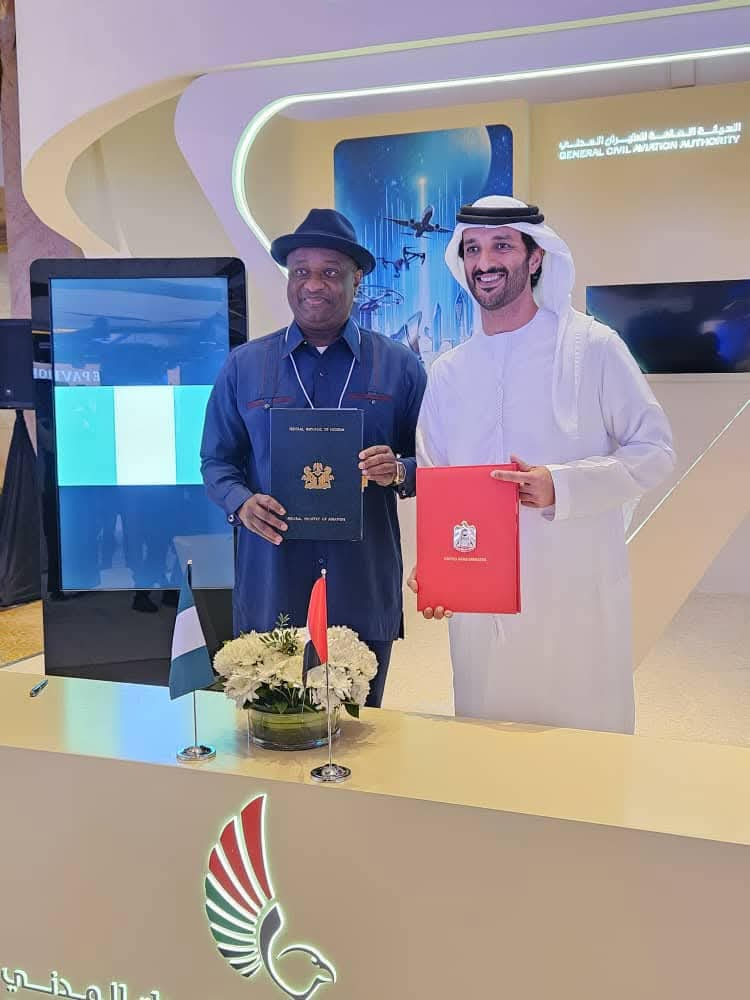By Emameh Gabriel
On Monday, February 9th, 2025, at the prestigious ICAO Global Implementation Support Symposium (GISS) in Dubai, the Honourable Minister of Aviation and Aerospace Development, Keyamo Keyamo (SAN) signed the amended Bilateral Air Service Agreement (BASA) with the United Arab Emirates (UAE), marking a significant milestone in Nigeria-UAE aviation relations. The landmark agreement has once again demonstrated Keyamo’s resolve to elevating Nigeria’s global aviation standing.
The agreement, signed alongside UAE’s Minister of Economy, H.E. Abdulla Bin Touq Al Marri, not only solidifies mutual aviation ties but also opens new doors for Nigerian airlines, including expanded codeshare agreements and interlining opportunities.
Keyamo’s diplomatic finesse was on full display as he advocated for a review of UAE’s visa restrictions on Nigerians, a move that could significantly boost passenger traffic and economic benefits for both nations. His efforts were met with high praise, as Al Marri commended Keyamo as “a man who keeps his words,” a testament to the Minister’s integrity and dedication.
Beyond the BASA, the signing of a Technical Cooperation Agreement underscores Keyamo’s vision for a robust and sustainable aviation sector. This agreement, focusing on capacity building, safety, and environmental standards, reflects Nigeria’s commitment to global best practices. Keyamo’s leadership at the symposium, backed by a formidable Nigerian delegation, has not only strengthened bilateral ties but also positioned Nigeria as a key player in the global aviation arena.
The amended BASA agreement is a culmination of months of meticulous negotiations and strategic planning. It builds on the foundation laid during last year’s discussions, ensuring reciprocal rights for both countries and fostering deeper synergy in the aviation sector. For Nigeria, this agreement represents a significant step forward in expanding its aviation footprint on the global stage. It provides Nigerian airlines with enhanced opportunities to operate in the UAE, thereby increasing their revenue potential and strengthening their competitive edge.
Keyamo’s emphasis on expanding codeshare agreements and interlining opportunities is particularly noteworthy. These initiatives will enable Nigerian airlines to partner with their UAE counterparts, offering passengers seamless travel experiences and boosting connectivity between the two nations. This is a win-win situation for both countries, as it will not only increase passenger traffic but also stimulate economic growth through increased tourism and business travel.
One of the standout moments of the symposium was Keyamo’s advocacy for a review of UAE’s visa restrictions on Nigerians. The current visa regime has been a significant barrier to increased passenger traffic between the two countries. His argument was both compelling and pragmatic. Easing visa restrictions would not only benefit Nigerian travelers but also boost the UAE’s economy by increasing the number of visitors from Nigeria. This move aligns with the Nigerian government broader vision of fostering mutually beneficial partnerships that drive economic growth and development.
The signing of the Technical Cooperation Agreement is another highlight of Keyamo’s achievements at the ICAO symposium. This agreement focuses on capacity building and technical support in key areas such as safety, regulatory compliance, environmental sustainability, and airport facilitation. It reflects Nigeria’s commitment to adopting global best practices and elevating its aviation sector to international standards.
The agreement will facilitate knowledge transfer and technical assistance from the UAE to Nigeria, enabling Nigerian aviation professionals to acquire the skills and expertise needed to excel in their respective fields. This is a critical step towards building a sustainable and resilient aviation sector that can compete on the global stage.
Among Nigeria’s delegation at the ICAO symposium includes: Capt. Chris Ona Najomo, Director General of the Nigerian Civil Aviation Authority (NCAA); Mrs. Olubunmi Kuku, Managing Director of the Federal Airports Authority of Nigeria (FAAN); Mrs. Olayinka T. Babaoye-Iriobe, Director of Air Transport Regulations at the NCAA; Capt. Abdullahi Mahmood, Director of Operations at FAAN; and Mr. Ahmed Tijani, Director of Air Transport Management at the Ministry of Aviation and Aerospace Development.
Each member of the delegation played a crucial role in ensuring the success of the symposium. Their expertise and dedication were instrumental in advancing Nigeria’s interests and securing the agreements that will drive the growth of the aviation sector.
As we celebrate this milestone, we look forward to the implementation of these agreements and the positive impact they will have on Nigeria’s aviation sector. Under Keyamo’s leadership, the future of Nigeria’s aviation industry is bright, and the sky is truly the limit.










































Discussion about this post